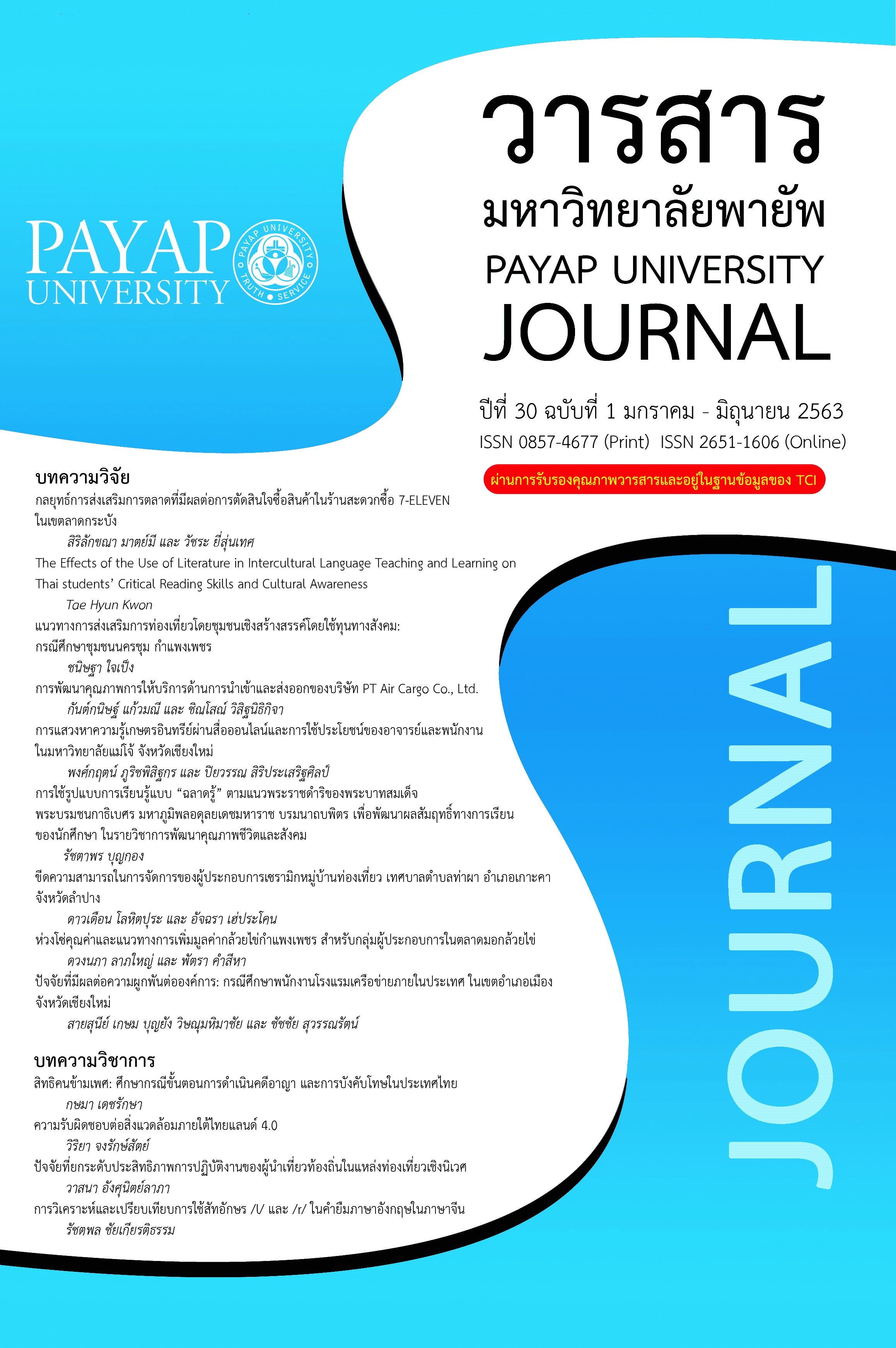ความรับผิดชอบต่อสิ่งแวดล้อมภายใต้ไทยแลนด์ 4.0
Main Article Content
บทคัดย่อ
ถึงแม้ว่า ในทศวรรษที่ผ่านมา การรับรู้เรื่องความรับผิดชอบต่อสิ่งแวดล้อมของกิจการในประเทศไทย ไม่ว่าในภาคเกษตร ภาคอุตสาหกรรม รวมทั้งภาคบริการจะเพิ่มขึ้น แต่บริษัทไทยส่วนใหญ่ มีเพียงแต่นโยบายทางสิ่งแวดล้อมและเน้นการรายงานข้อมูลสิ่งแวดล้อม เพียงเพื่อให้เป็นไปตามระเบียบและข้อบังคับของหน่วยงานของรัฐ และเพื่อเสริมสร้างภาพพจน์ให้กับองค์กร โดยปราศจากการดำเนินกิจกรรมความรับผิดชอบต่อสิ่งแวดล้อมที่แท้จริง และการรายงานข้อมูลสิ่งแวดล้อมในลักษณะดังกล่าว ไม่สามารถตอบสนองความต้องการของผู้มีส่วนได้เสียทุกกลุ่ม
บทความนี้ จึงมีวัตถุประสงค์เพื่อเสนอแนวความคิดเกี่ยวกับการพัฒนาอย่างยั่งยืนขององค์กรธุรกิจ และแนวทางในการส่งเสริมให้องค์กรต่าง ๆ แสดงความรับผิดชอบต่อสิ่งแวดล้อมภายใต้โมเดลไทยแลนด์ 4.0 อย่างจริงจัง
การจัดทำรายงานตามกรอบการจัดทำรายงานขององค์กรแห่งความริเริ่มว่าด้วยการรายงานสากล (GRI) ยังเป็นอีกแนวทางหนึ่ง ที่จะส่งเสริมให้ให้องค์กรต่าง ๆ แสดงความรับผิดชอบต่อสิ่งแวดล้อมและช่วยผลักดันให้บริษัทไทยทำกิจกรรมความรับผิดชอบต่อสิ่งแวดล้อมและสังคมอย่างจริงจัง รวมทั้งช่วยสร้างความสมดุลทั้งด้านเศรษฐกิจ สังคม และสิ่งแวดล้อม ซึ่งจะสร้างคุณค่าให้กับกิจการในบริบทของความยั่งยืน สอดคล้องกับแนวคิดการพัฒนาอย่างยั่งยืน ของสภาธุรกิจโลกเพื่อการพัฒนาที่ยั่งยืน หากการจัดทำรายงานตามกรอบของ GRI ได้กลายเป็นข้อบังคับสำหรับบริษัทไทย อาจจะช่วยส่งเสริมให้กลไกการขับเคลื่อนโมเดลไทยแลนด์ 4.0 บรรลุเป้าหมาย ในส่งเสริมการผลิตและการบริโภคที่เป็นมิตรกับสิ่งแวดล้อม
Article Details
เอกสารอ้างอิง
กรมควบคุมมลพิษ. (2560). รายงานสถานการณ์มลพิษของประเทศไทย ปี 2560, สืบค้นเมื่อ 6 มีนาคม 2561. http://infofile.pcd.go.th/pcd/DraftPollutionReport2017.pdf?CFID=2263903 &CFTOKEN=37416219.
กรมทรัพยากรทางทะเลและชายฝั่ง. (2539). พระบรมราโชวาทและพระราชดำรัสของพระบาทสมเด็จพระเจ้าอยู่หัว, สืบค้นเมื่อ 15 พฤศจิกายน 2561. http://www.dmcr.go.th/detailAll/24 42/pc/23/.
กลุ่มมิตรผล. (2561). รายงานความยั่งยืน ประจำปี 2561, สืบค้นเมื่อ 29 ธันวาคม 2562. https://www.mitrphol.com/pdf/Sustainability-Report-Executive-Summary-2018-TH.pdf.
กิตติมา อัครนุพงศ์. (2558). การศึกษาการเปิดเผยข้อมูลการบัญชีสิ่งแวดล้อม: กรณีศึกษาบริษัทจดทะเบียนที่อยู่ในอุตสาหกรรมที่มีผลกระทบต่อสิ่งแวดล้อมในประเทศไทย. วารสารวิชาชีพบัญชี, 11(32), 73-98.
จันทนา ธนสารบริสุทธิ์ และมนวิกา ผดุงสิทธิ์. (2558). คุณลักษณะของบริษัทกับการเปิดเผยข้อมูลด้านสังคมและสิ่งแวดล้อม: กรณีศึกษาบริษัทจดทะเบียนในตลาดหลักทรัพย์ เอ็ม เอ ไอ. วารสารวิชาชีพบัญชี, 11(30), 25-40.
ฐิติมา กิ่งแก้ว และมนวิกา ผดุงสิทธิ์. (2555). ปัจจัยที่ส่งผลต่อการเปิดเผยข้อมูลด้านสิ่งแวดล้อมตามความสมัครใจของบริษัทจดทะเบียนในตลาดหลักทรัพย์แห่งประเทศไทย. ใน การประชุมวิชาการ บัณฑิตศึกษาระดับชาติ ครั้งที่ 2 (น. 1-22). กรุงเทพฯ: มหาวิทยาลัยธรรมศาสตร์.
นริศรา อยู่จรรยา และสุชาดา เจียมสกุล. (2561). ดัชนีการเปิดเผยข้อมูลด้านสิ่งแวดล้อมกับผลการดำเนินงานของบริษัท. วารสารบริหารธุรกิจเทคโนโลยีมหานคร, 15(1), 83-102.
พิพัฒน์ นนทนาธรณ์. (2553). การจัดการความรับผิดชอบต่อสังคมขององค์กร: การสร้างข้อได้เปรียบในการแข่งขันอย่างยั่งยืน. นนทบุรี: ธิงค์ บียอนด์ บุ๊ค.
มัทนชัย สุทธิพันธุ์. (2555). การเปิดเผยข้อมูลสิ่งแวดล้อมในรายงานประจำปีของบริษัท: กรณีศึกษาบริษัทขนาดใหญ่ 50 บริษัทที่จดทะเบียนในตลาดหลักทรัพย์แห่งประเทศไทย. จุฬาลงกรณ์ธุรกิจปริทัศน์, 34(132), 47-67.
มัทนชัย สุทธิพันธุ์. (2556). ทางออกของธุรกิจไทยสู่หนทางแห่งการพัฒนาอย่างยั่งยืน. วารสารบริหารธุรกิจ, 36(137), 38-50.
วิภา จงรักษ์สัตย์. (2559). การเปิดเผยข้อมูลความรับผิดชอบต่อสังคมของกิจการในประเทศไทย. วารสารศรีนครินทรวิโรฒวิจัยและพัฒนา (สาขามนุษยศาสตร์และสังคมศาสตร์), 8(5), 128-144.
วิริยา จงรักษ์สัตย์. (2560). ความสัมพันธ์ระหว่างรายงานข้อมูลสังคมและสิ่งแวดล้อมกับผลการดำเนินงานทางการเงินของบริษัทจดทะเบียนในตลาดหลักทรัพย์แห่งประเทศไทยกลุ่มดัชนีเซท 100. รายงานวิจัยฉบับที่ 371. มหาวิทยาลัยพายัพ: เชียงใหม่.
วิริยา จงรักษ์สัตย์. (2561).การเปิดเผยข้อมูลทางสังคมและสิ่งแวดล้อมตามกรอบการจัดทำรายงานของ GRI: กรณีศึกษา บริษัทจดทะเบียนในตลาดหลักทรัพย์แห่งประเทศไทยกลุ่มดัชนีเซท 100. วารสารเกษตรศาสตร์ธุรกิจประยุกต์, 12(7), 1-22.
วาริน ลีมะวัฒนา. (2008). ISO 26000 มาตรฐานใหม่ สังคมไทย. วารสาร For Quality, 15(131), 36-40.
วรัท วินิจ. (2559). ระดับคุณภาพความสัมพันธ์ระหว่างองค์กรกับผู้มีส่วนได้เสีย. วารสารบริหารธุรกิจ, 39(149), 1-22.
ศิลปพร ศรีจั่นเพชร. (2560). การบัญชีตามความรับผิดชอบ. วารสารวิชาการบริหารธุรกิจ, 6(1), 25-32.
สถาบันไทยพัฒน์. (2554). รายงานเพื่อความยั่งยืน: Reporting Your CSR, สืบค้นเมื่อ 20 มิถุนายน 2557. https://thaicsr.sharefile.com/requireduserinfo.aspx?id=s128465f54404bad8&type=send.
สถาบันไทยพัฒน์. (2555). ไขปัญหาเขียน SD Report ยึดกรอบ GRI สร้างความยั่งยืน, สืบค้นเมื่อ
มิถุนายน 2562. http://www. thaicsr.com/2012/11/sd-report.gri.html.
สถาบันธุรกิจเพื่อสังคม. (2555ก). แนวทางความรับผิดชอบต่อสังคมของกิจการ. กรุงเทพฯ: เมจิกเพรส.
สถาบันธุรกิจเพื่อสังคม. (2555ข). วิธีการจัดทำรายงานแห่งความยั่งยืนตามกรอบของ GRI Version 3.1, สืบค้นเมื่อ 30 มิถุนายน 2562 http://www.csri.or.th/index.php/2012-03-19-10-53-35/2012-03 -19-10-57-06/item/2247.
สำนักงานคณะกรรมการพัฒนาการเศรษฐกิจและสังคมแห่งชาติ. (2560). สรุปสาระสำคัญแผนพัฒนาเศรษฐกิจและสังคมแห่งชาติ ฉบับที่สิบสอง พ.ศ. 2560-2564, สืบค้นเมื่อ 14 พฤศจิกายน 2562. www.nesdb.go.th/ewt_dl_link.php?nid=6422.
สิรีนาฎ นาคเลิศ และมัทนชัย สุทธิพันธุ์. (2559). อิทธิพลของการกำกับดูแลกิจการต่อการเปิดเผยข้อมูลด้านสิ่งแวดล้อมของบริษัทจดทะเบียนในตลาดหลักทรัพย์แห่งประเทศไทย. จุฬาลงกรณ์ธุรกิจปริทัศน์, 38(149), 1-37.
สุภัทวษร ทวีจันทร์. (2556). การบัญชีความรับผิดชอบต่อสังคมและสิ่งแวดล้อม: ความสำเร็จองค์กรอย่างยั่งยืน. วารสารมหาวิทยาลัยนเรศวร, 21(1), 136-141.
เสาวรส กรรณขจิต และมัทนชัย สุทธิพันธุ์. (2557). ความสัมพันธ์ระหว่างการเปิดเผยข้อมูลสิ่งแวดล้อมและผลการดำเนินงานทางการเงินของบริษัทในประเทศไทย: กรณีศึกษาเปรียบเทียบบริษัทที่จดทะเบียนในตลาดหลักทรัพย์แห่งประเทศไทย ระหว่างอุตสาหกรรมอสังหาริมทรัพย์และการก่อสร้าง และอุตสาหกรรมการเกษตรและอาหาร. วารสารบริหารธุรกิจ, 37(144), 67-71.
อรุณี ตันติมังกร และศุภกร เอกชัยไพบูลย์. (2560). GRI Standards: จากการรายงานสู่เครื่องมือการจัดการธุรกิจอย่างยั่งยืน, สืบค้นเมื่อ 30 มิถุนายน 2560 จาก https://www.setsustainability.com /libraries/628/item/315-gri-standards.
เอสซีจี. (2561). รายงานการพัฒนาอย่างยั่งยืน ประจำปี 2561, สืบค้นเมื่อ 29 ธันวาคม 2562. https://scc.listedcompany.com/misc/sustainability_report/20190530-scc-sdr-2018-th-02.pdf.
Costa Tavares, M.C. (2018). Digital communication management, Retrieved January 20, 2020, from http://dx.doi.org/105772/intechopen.76221.
Deegan, C. (2002). The legitimising effect of social and environmental disclosures-a theoretical foundation. Accounting, Auditing and Accountability Journal, 15(3), 282-298.
Gray, R., Owen, D., & Adams, C. (1996). Accounting and accountability: Changes and challenges in corporate social and environmental reporting. London: Prentice Hall.
Joshi, S., & Krishnan, R. (2010). Sustainability accounting: System with a managerial decision focus. Cost Management, 24(6), 20-30.
Kuasirikun, N., & Sherer, M. (2004). Corporate social accounting disclosure in Thailand. Accounting, Auditing & Accountability Journal, 17(4), 629-660.
Lynch, B. (2010). An examination of environmental reporting by Australian state government departments. Accounting Forum, 34, 32-45.
Mohd Ghazali, N.A. (2007). Ownership structure and corporate social responsibility disclosure: Some Malaysian evidence, Corporate Governance, 7(3), 251-266.
Mosnja, L. & Grzinic, J. (2019). Environmental accounting in function of sustainable development of highly touristic region of Istria. International Journal of Accounting and Financial Management, 34, 650-689.
Prayukvong, P., & Olsen, M. (2009). Research paper on promoting corporate social responsibility in Thailand and the role of volunteerism. The Network of NGO and Business Partnerships for Sustainable Development. Retrieved December 13, 2015, from http://www.undp.or.th/UNV/documents/ResearchontheCSRDevelopmentin Thailand_000.pdf.
Rajanakorn, N. (2012). Examining corporate social responsibility in Thailand: A view from Thai companies. Doctoral dissertation, University of Tennessee Knoxville, United State of America.
Ratanajongkol, S., Davey, H., & Low, M. (2006). Corporate social reporting in Thailand: The news is all good and increasing. Qualitative. Research in Accounting & Management, 3(1), 67-83.
Sherman, W.R. (2009). The global reporting initiative: What value is added?. International Business & Economics Research Journal, 8(5), 9-12.
Suttipun, M., & Stanton, P. (2012). The differences in corporate environmental disclosures on websites and in annual reports: A case study of companies listed in Thailand. International Journal of Business and Management, 7(14), 18-31.
World Business Council on Sustainable Development. (1999). Corporate social responsibility: meeting changing expectation. Geneva: Author.
Wuttichindanon, S. (2017). Corporate Social Responsibility Disclosure- Choice of Report and its Determinants: Empirical Evidence from Firms Listed on the Stock Exchange of Thailand. Kasetsart Journal of Social Sciences, 38(2), 156-162.


